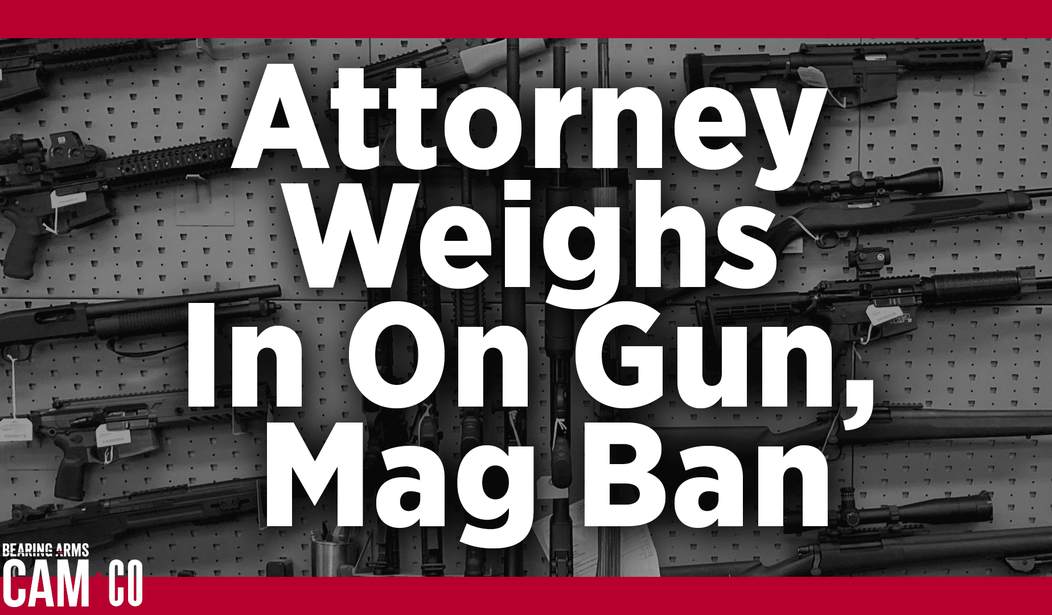I’m thrilled to have Second Amendment attorney C.D. “Chuck” Michel as today’s guest on “Bearing Arms’ Cam & Co,” and I’m glad that he could stick around for a while because we had plenty to talk about.
Our first and primary topic of conversation is Illinois’ new ban on so-called assault weapons and “large capacity” magazines. While Michel is primarily known for taking on California gun laws as executive director and general counsel for the California Rifle & Pistol Association, he’s also serving as lead counsel for the Illinois Gun Rights Alliance; a new coalition comprised of Federal Firearms Licensees of Illinois, Gun Owners of America, State Line Rifle Association, Aurora Sportsmen’s Club, and Guns Safe Life. Michel says his team has been busy drafting their initial complaint and picking the best candidates from their pool of plaintiffs and anticipates that the suit will be filed in federal court in Illinois by the end of the week.
Michel says it’s obvious that the legal minds who drafted the Illinois ban have been talking to their California counterparts, because “almost everything that was a problem in California, they’ve tried to address by writing something that expands it.”
“So, on the magazine ban out here, for a while, people were buying repair kits that arguably could be used to modify the magazine so it could hold more rounds,” Michel elaborated.
“Well, now they’re banning not just repair kits but tools. This thing goes so far that it will ban many tools that could be used to modify a magazine. They’ve gone overboard. It’s an assault screwdriver now.”
Michel is eager to get this case in front of a judge and request an injunction barring enforcement, but the Illinois challenge is just one of many Second Amendment lawsuits that he’s engaged in at the moment; including litigation taking on California’s own bans on “large capacity” magazines and “assault weapons.” In those cases, which are currently pending before U.S. District Judge Roger Benitez, California Attorney General Rob Bonta recently presented the court with a list of supposed historical analogs to the state’s ban. Not only does this give us a preview of the defense that’s likely to be used by Illinois, Michel says the list may be long but it’s awfully short on actual analogs to today’s prohibitions.
“I have to say, I thank Judge Benitez for asking them to throw in that kitchen-sink list of all the gun laws that they could come up with,” he told me gleefully. Michel says that the gun control lobby and their anti-gun allies in blue state AG offices have been trying to stall the courts and asking for more time to dig through the historical record in search of some mythical statute that would justify their flagrant infringements.
“They keep acting like this is some sort of National Treasure hunt and they’re gonna pull the Bill of Rights out of the National Archives, flip it over, put lemon juice on it, and discover secret writing in invisible ink from the Founders that says ‘assault weapons bans are okay.’ That’s the suggestion that they were making, and they’ve been called on it. So here it is, here’s the universe of gun control laws [referring to Bonta’s list]. There are no historical analogs to the modern laws.”
Michel believes that’s going to be one of the big legal fights going forward; just how close does a law have to get to be a valid analog? Are bans on Bowie knives the equivalent of a ban on “assault weapons”? The AGs of California (and likely Illinois, too) will argue yes, though I would argue that a knife ban isn’t analogous at all to a gun ban, given that multi-shot revolvers were becoming increasingly common and popular at the same time the Bowie knife was drawing the approbation of some state legislatures. There simply are no 18th or 19th-century bans on firearms based on their rate of fire, capacity, or muzzle velocity, much less their appearance or cosmetic features. Any longstanding laws of those nature would be examples of clear analogs, but they don’t exist.
In addition to the Illinois litigation, I also asked Michel about the California counties that have yet to issue a concealed carry license more than seven months after the Bruen decision was handed down. The CRPA chief says they’re giving the side eye to several counties, but Alameda County is probably their top priority at the moment. The organization recently sent the county sheriff a letter that Michel says amounts to a demand to cease and desist the permitting delays, and the CRPA is ready to litigate and gathering potential plaintiffs all across the state.
This is just a small portion of a very beefy conversation about the current legal landscape for the Second Amendment, and I’d encourage you to check out the whole thing in the video window below. We’ll be having Chuck back again very soon, and I thank him for giving us some great information and food for thought on today’s show.









Join the conversation as a VIP Member